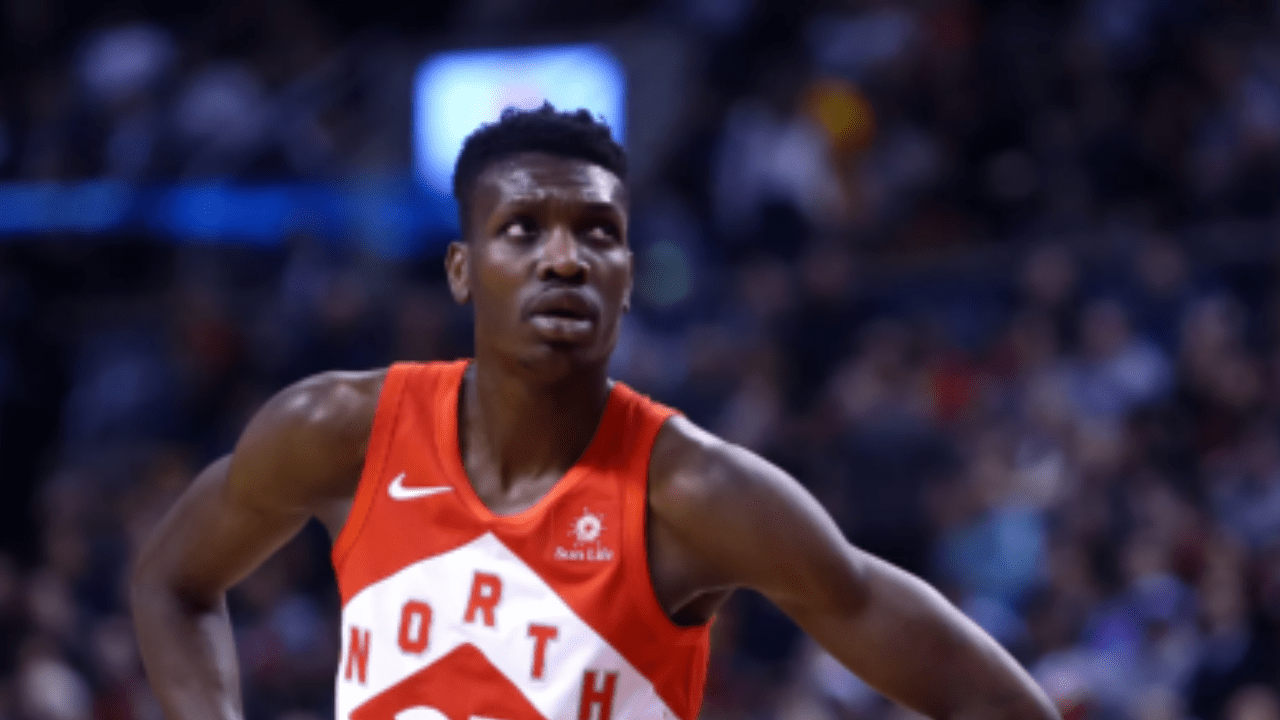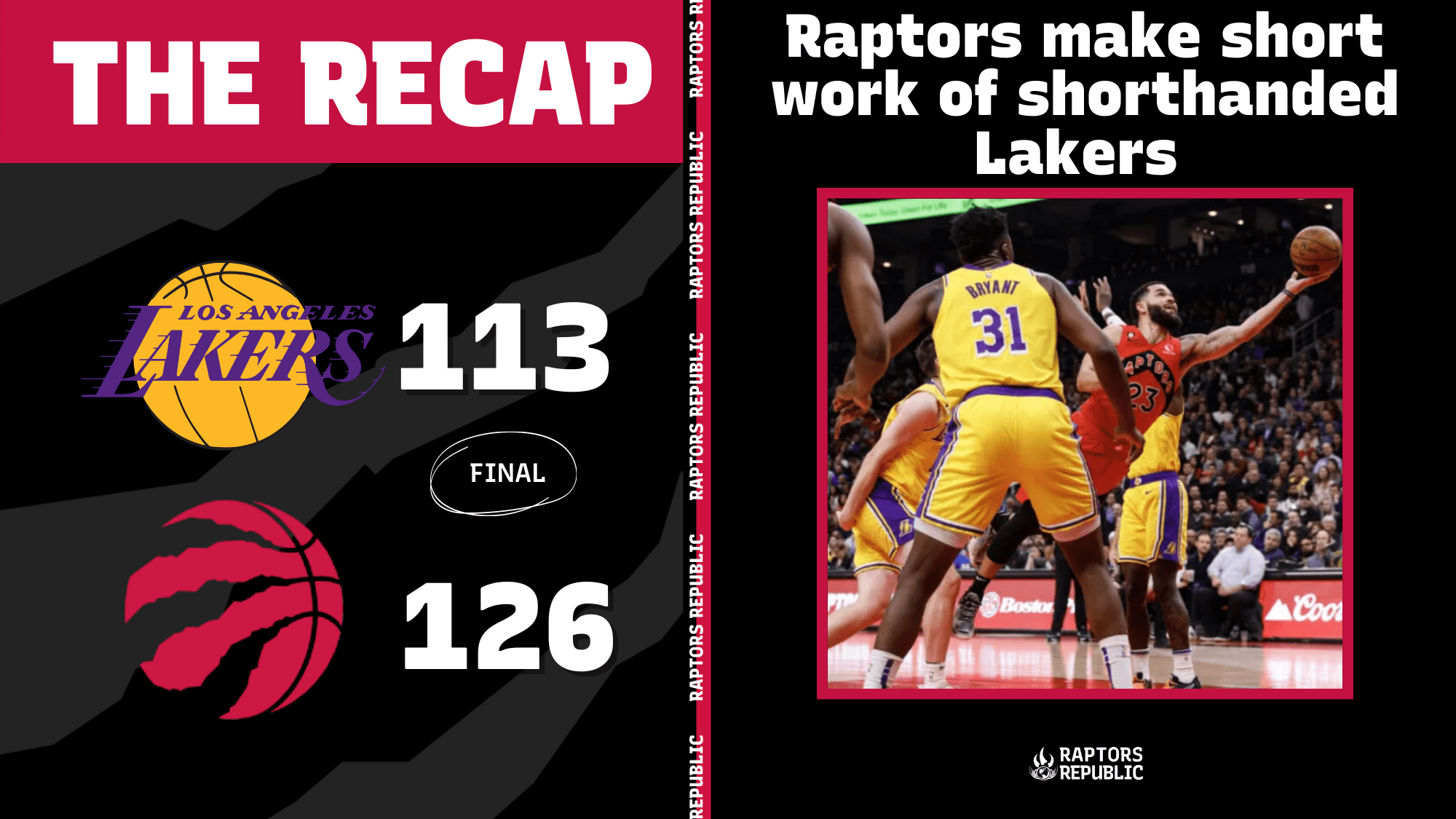As a basketball player, Chris Boucher has not always been what he is now. Once upon a time, he struggled against Jonah Bolden in the NBA G League. Though he was a great shot blocker and rebounder, he was not a terrific positional defender. He was raw and didn’t read plays well. His effort varied from extraordinary to, at times, average, particularly when plays weren’t run for him by the Raptors 905.
Those former holes in his game have become his greatest strengths. Boucher is now as dependable as a bench player can be in the NBA. He is among Toronto’s handful of best rebounders — dealer’s choice for anywhere between second best to perhaps third or fourth if you’re being critical — against whom size is no solution. He is first in offensive rebounding per game for Toronto and second in per-36-minutes total rebounding. He is always in great position, and he doesn’t chase blocks and hurt the defense as a result. He virtually never has plays run for him yet contributes by crashing the glass with vengeful abandon, creating his touches out of thin air. He splashes jumpers, even from the midrange this season.
“The older I get, it’s good to see I’m getting better,” said Boucher after Toronto’s win over the Los Angeles Lakers. “It’d be bad to get older and just make the same mistakes so that’s something that just makes the game more fun. There’s a lot of stuff I didn’t know about the game, there’s a lot of rotations – I’ve seen [media write that] I could’ve gotten better at a lot of things, and I never understood why but when you start doing it a little bit better you’re like, ‘Oh, those are the things I could’ve gotten better at the past year or even before.’”
It’s difficult for NBA players to change their games. It’s very difficult for NBA players to change their games when they’re signed to low-money contracts. And it’s exceptionally difficult for NBA players to change their games without changing employers in the process. In his five years with the Raptors franchise, Boucher has accomplished the exceptionally difficult.
Boucher hasn’t remade his game at random. Yes, he’s smoothed over his rough edges and become a significantly more complete player. But he has grown in exactly the ways that Toronto needed. Boucher hasn’t just reformed himself to fit the shape required of him in the macro, but he’s done in on an individual game-by-game basis.
Toronto saw its offense stymied by a Lakers’ zone with both Fred VanVleet and Pascal Siakam on the bench, so Boucher hit a pair of midrange turnaround jumpers to squeeze points from a stone. It certainly wasn’t the team’s first option.
“If you run [zone offense] a couple times, you’re gonna have to look further down the line, and one of those [options] is Chris flashing in there at the nail,” said Nick Nurse after the game. “And I think he made two of ‘em kind of like that where it flashed in there. So that’s good, especially, I mean, we took the threes already and usually that’s what’s next, they usually adjust to that and that guy’s got to flash in there and make a play.
“He made a couple good ones, and I think we needed those,” Nurse continued.
Toronto was shooting terribly from 3-point range — it finished sub-30 percent, which is increasingly becoming an issue — so Boucher stepped up and connected on two corner triples, the former coming on a jab-step pullup that had no business finding the bottom of the net.
In many ways, Boucher has become the figurehead of this team.
Let’s play a game: Who am I describing? He is extraordinarily long and mobile, with a top-30 leaguewide differential between his height and wingspan. And he’s a power forward. He’s more been press ganged into shooting 3-pointers than he is a natural at it. He wins offensive possessions by athleticism most of all, which manifests in his manic offensive rebounding. He closes out like a madman on the defensive end, covering the entire court with rapidity due to his giant strides. (He actually has the highest frequency of closeouts on the team and holds opposing offenses to a laughably low efficiency when he’s closing out to shooters. By some marks, he is a top-five closer-outer in the league.)
If you guessed “the entire roster of the Toronto Raptors,” you’d be correct in spirit! But of course this is specifically describing Boucher — the eponymous protagonist of this story. Sure, the foundations of the Raptors are built upon mostly superstar Siakam and to a lesser extent stars O.G. Anunoby and VanVleet. But the spirit of the team is embodied by Boucher.
Even the way Boucher enters the game helps the Raptors.
“We love bringing him off the bench because when you call his name, he does that sprint off the bench and he sprints out on the floor and as quirky as that may seem, it is a boost of hustle and energy that gets contagious sometimes,” explained Nurse.
After Toronto’s 126-113 win over the Lakers, the Raptors are now 8-3 in games in which Boucher shoots 50 percent or better from the field this season. To throw some simple math at you, they are 5-9 in games when Boucher does not shoot 50 percent or better from the field. But that’s far from the only Boucher statistic that correlates with Toronto winning or losing. When Boucher hits at least one triple, the Raptors are now 8-4. They are 8-5 when he gets at least one steal. (The Raptors are 4-1 when Boucher gets a steal and hits a triple and makes half or more of his shots.)
“I think now it’s more what the game is giving me,” said Boucher of his development. “People have seen a lot of games where I’m getting offensive rebounds, shooting corner threes and stuff. Now, they’re adjusting, running me off the line and all that, usually, I don’t have the clear lane because they’re packing the paint so [the midrange is] the type of stuff I’m trying to work on.”
The lesson is largely this: As Boucher goes, so do the Raptors. They don’t just need him to shoot efficiently. Nor do they need him to rebound. Nor do they need him to steal the ball. The Raptors need him to do all of the above and then some. It’s a far cry from his game several years ago.
And when he does do all of the above, they are a stable and successful team — this during a very unstable and mediocre (record-wise) season. Boucher has grown so much during his career that he has made himself indispensable, despite playing on a team with a roster full of players who ostensibly share his skillset; even on a unique team, Boucher remains uniquely himself. He is a worthwhile timekeeper for Toronto’s success. He is the canary in the coal mine of their slugfest games. And as he continues to find his rhythm going forward, so too should the Raptors.



